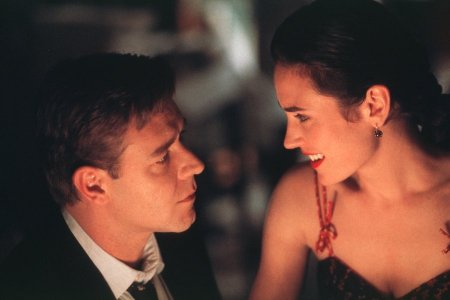Not that this has anything to do with the film or the story, but I find it quite unusual to refer to a mind, which is an abstract entity and thus not visible, as beautiful. To me, the word "beautiful" describes something which is pleasing to look at. When describing a mind, I would be more inclined to use words such as extraordinary, sophisticated, or perhaps labyrinthine, but I would reserve "beautiful" to describe nature, cars, and, of course, women.
Speaking of beautiful women, Jennifer Connelly is a BABE! She is definitely "pleasing to look at." However, the "beautiful mind" alluded to by the film's title is not meant to describe her or her character. That description is intended for John Nash, Jr., real-life winner of the Nobel Prize and mathematics professor at Princeton University (portrayed by Russell Crowe).
What the title does get right is the "mind" part. This movie is not really about John Nash, but rather it is about his mind. The film takes us inside his mind, an arduous task to be sure, but one that works. We first meet Mr. Nash on his first day of graduate school at Princeton. Blessed with a superior intelligence, he makes it his life's goal to make a difference...to make his indelible mark upon history. We soon discover that he is eccentric, to say the least, but we see things from his point of view. He disdains class (seen as a waste of his time), is slow to make friends, and is absolutely horrible in dealing with women.
Eventually, he finds his remarkable idea which becomes his doctoral thesis, and he graduates with honors. Upon graduation he finds that his talents are requested and needed by the US Government to work as a code-breaker (decryption agent) which he balances with his work at the University. Along the way, he becomes good friends with his college roommate, accepts the burden of performing top-secret work for the NSA, and falls in love with a student, Alicia (Connelly - below with Crowe - hey, that rhymes).
WARNING - DO NOT READ PAST THIS POINT IF YOU HAVE NOT YET SEEN THE MOVIE - JUST TRUST ME THAT IT IS GOOD

A revelation comes about two-thirds of the way into the movie. We realize that John suffers from schizophrenia (which is quite different from multiple personality disorder, contrary to what is commonly believed). We find that several of the main relationships in his life are with imaginary persons fabricated by his mind. Director Ron Howard then gives us glimpses of John Nash from other people's frame of reference, most notably his wife, Alicia's.
We soon see how difficult it is for others to understand him, let alone help him. His wife's patient caring for him really takes its toll on her as her frustration mounts. Connelly's acting here is superb. We see her go from a young love interest, fascinated by John's mind, to being his wife, to being his neglect, to being his caretaker, to being a mother, and to eventually becoming overwhelmed with the harsh realities of life. However, in the end, it is her love and faith and trust which help John to overcome his mental illness, or at least keep it from controlling him. Look for Jennifer Connelly to grab an Oscar for this one.
And lets certainly not forget Russell Crowe. His portrayal of Nash is brilliant. We witness almost everything in this movie through him, and without a performance such as his this movie would have been a complete failure -- instead, it is a great success. While I am critical of his reception of the Oscar last year for Gladiator, I find him quite deserving of it this year.

Other notable performances came from Paul Bettany, as Nash's fictitious roommate, and Ed Harris as William Parcher, the government agent who is another fabricated person in the mind of Nash.
One detraction from this film and the script is its weak use of unimportant characters to explain various points to the audience. For example, before John Nash makes his way to teach a Calculus class, one of his associates says to him, "You know how it works John. We get to stay here and think deep thoughts as long as we are willing to teach a class every now and then." My beef with a line like this is that John obviously knew this already. It doesn't make sense for this character to utter this to him other than to let the audience know this piece of information. While it may seem like a good way to educate us, it doesn't fit with the story. It is awkward when put in the context of the characters involved and what they might be thinking and feeling. To me, this is a cheap movie trick that doesn't quite work, and it is done here several times.
All in all, however, A Beautiful Mind winds up being a beautiful movie, and one that I will be recommending to many of my friends.
 This is a must-see film with extraordinary acting and a brilliant script.
This is a must-see film with extraordinary acting and a brilliant script.


